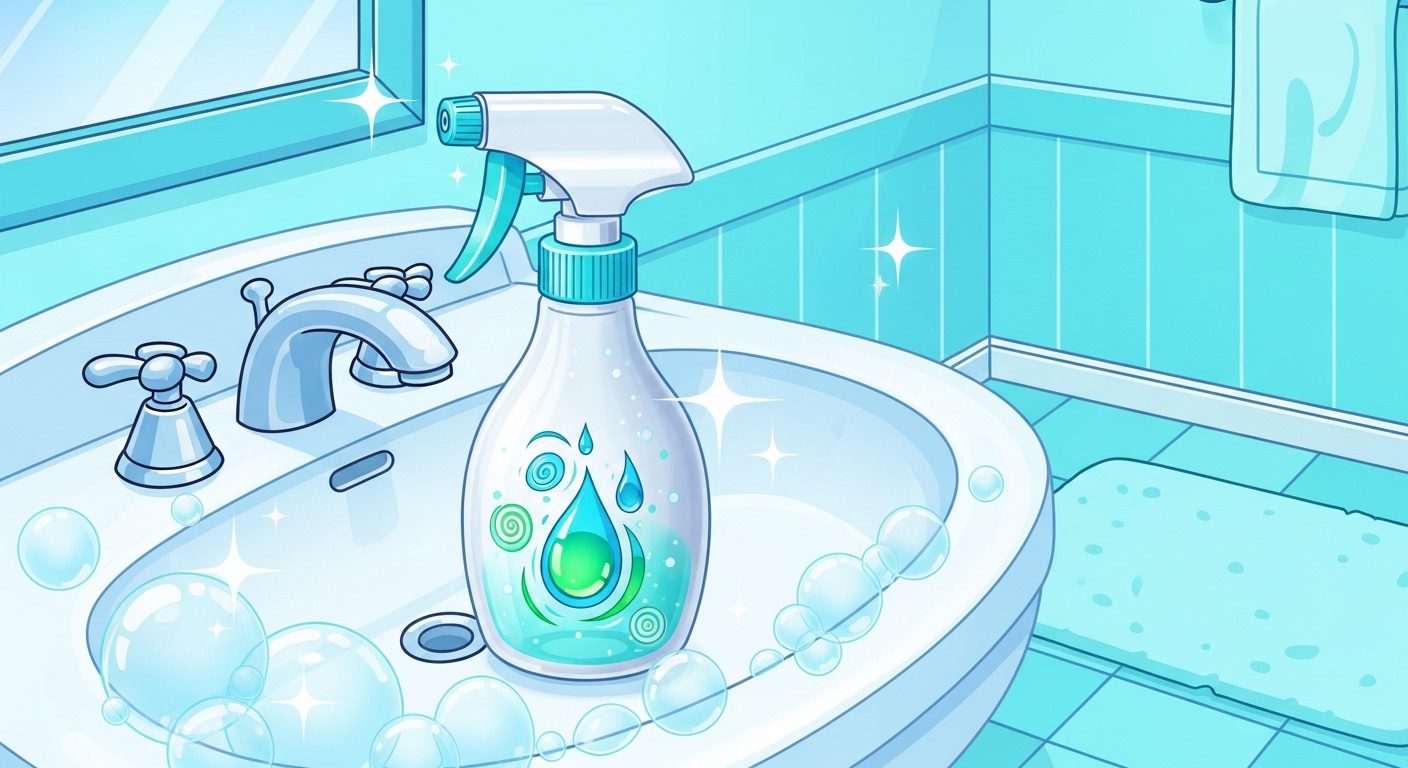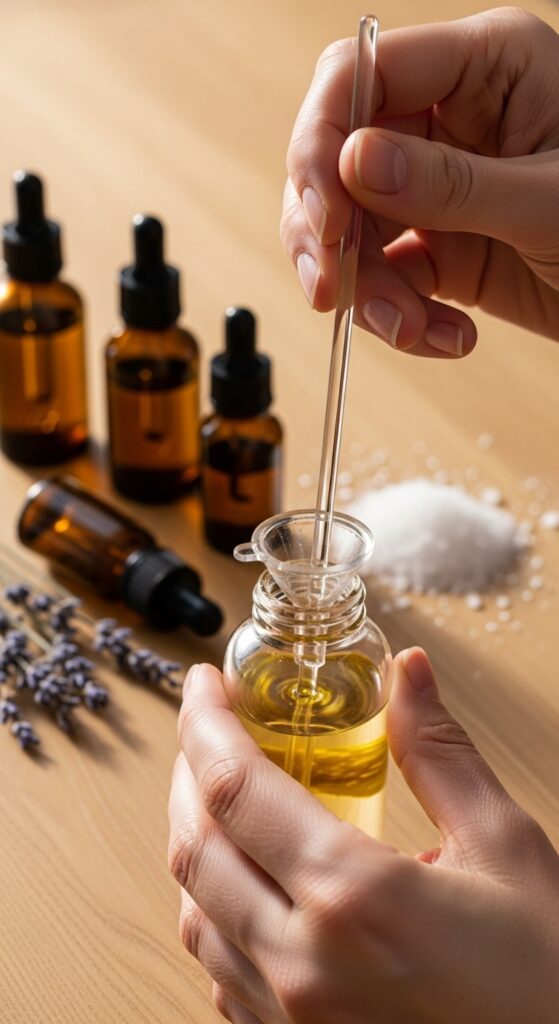Using essential oils in homemade cleaning solutions elevates a basic cleaner into something aromatic and with extra antimicrobial support (though not a substitute for disinfection). Many essential oils have properties that help with grease, odors, mold, or bacteria. New Directions Aromatics+2Clean My Space+2
Over the years, the author has shifted from harsh store cleaners toward blends with essential oils because they smell wonderful, reduce synthetic chemical exposure, and—when used properly—are effective for day-to-day cleaning.
Important note: Essential oils are not approved as a full disinfectant. They help with cleaning and reducing some microbes, but for heavy sanitization (like in a pandemic or after illness) one must still rely on stronger disinfectants. Better Homes & Gardens
Choosing High-Quality Essential Oils & Tools
To get the best results:
- Use 100% pure, therapeutic-grade or GC-tested essential oils. Avoid oils with additives or synthetic fragrances.
- Store blends in dark glass bottles (amber or cobalt) because essential oils can degrade plastic over time. New Directions Aromatics+1
- Always label your mixtures with oil names, ratios, and dates.
- Shake before use—oil and water separate naturally.
- Do a patch test on a small area to ensure the surface tolerates it.
Product Suggestions (honest reviews)
Here are a couple of tools/oil kits the author has tested and found useful (and still uses):
Plant Therapy 6-Essential Oil Set — a small starter kit of lemon, tea tree, lavender, peppermint, eucalyptus, etc. The aroma is clean, and these oils mix well with water/vinegar bases.
- CONVENIENT BLENDS: The Top 6 Blends set features six of the best healing blends by Plant Therapy: Energy, Germ Fighter, …
- PURITY IN EVERY DROP: Our blends contain 100% certified pure therapeutic grade essential oils! Whether you are looking t…
- BATCH SPECIFIC GC-MS REPORTS ON EVERY OIL: Every bottle of oil from Plant Therapy goes through multiple rounds of testin…
Majestic Pure Lemon Essential Oil — excellent as a degreasing, citrus-based oil for harder surfaces.
- 100% PURE & NATURAL LEMON OIL – Majestic Pure Blends oils are exactly that! Many oils being sold make that claim but are…
- PREMIUM GRADE & QUALITY – All Majestic Pure Blends Essential Oils are tested by an independent lab to test the efficacy …
- HIGH QUALITY GLASS BOTTLE – Our Essential Oil comes in an amber glass bottle to keep out UV rays and protect the oil aga…
These are available on Amazon and often allow you to test quality without spending big. Because the author has tried these in kitchens, bathrooms, and floors, she knows firsthand how they perform in real-life messes.
DIY Cleaning Solution Recipes with Essential Oils
Here are several recipes the author has used and refined. Always use distilled or boiled-cooled water for safety.
1. All-Purpose Cleaner (spray)
- ½ cup white vinegar
- 1½ cups distilled water
- 1 teaspoon mild dish soap (non-scented)
- 15–25 drops essential oil (e.g. lemon, tea tree, eucalyptus)
Mix in a dark glass spray bottle. Use on counters, sinks, tile, door knobs, and everyday surfaces. Shake before each use. This is her go-to for general cleaning.
Tidy Up Portland!+1
2. Soft Scrub for Tub, Sink, Grout
- ¼ cup baking soda
- Enough water to make a paste
- 5–10 drops essential oil (e.g. lavender, lemon, or tea tree)
Apply on tub walls or grouted areas, let sit 5–10 minutes, scrub, then rinse. This is gentler than harsh commercial formulas but effective for regular maintenance.
Tidy Up Portland!+1
3. Glass & Mirror Cleaner
- 1 cup water
- 1 cup distilled witch hazel or rubbing alcohol
- 10 drops lemon or orange essential oil
Spray on glass surfaces and wipe with microfiber. The citrus oils help cut grease and leave a fresh scent.
4. Carpet & Rug Freshener
- 1 cup baking soda
- 10 drops essential oil (peppermint, lemon, or lavender)
Sprinkle lightly over the carpet, let sit 15–30 minutes, then vacuum. I’ve used this in living rooms after guests and always credited it for getting rid of lingering odors.
How to Clean Different Surfaces Safely
Here’s how the author applies these blends around the house:
- Hard surfaces (tiles, counters, sinks): Use the all-purpose spray or scrub version.
- Glass/mirrors: Use the glass formula.
- Tubs & showers: Use soft scrub or all-purpose spray, let it dwell before scrubbing.
- Cabinets, doors, wood trim: Use lighter sprays (low vinegar) or dilute further. Always test first.
- Avoid using essential-oil sprays on stone (granite, marble)—some oils and vinegar may etch or leave residue. The Spruce
- Upholstery or fabric: Extremely dilute blends or stick to dry deodorizers (baking soda + oil).
- Pets and children: Use caution—strong oils may irritate. Ventilate after use and avoid direct contact.
Safety, Limitations & Tips from Experience
- Essential oils are powerful—don’t overdo it. Use moderate dilution (1–2 % concentration or less in many cases).
- Not all surfaces tolerate vinegar or citrus. Always test first.
- Essential oils don’t replace disinfectants. Use them for cleaning; in high-risk or germ scenarios, follow with approved sanitizers. Better Homes & Gardens
- Keep mixtures fresh — I typically make small batches (100–200 ml) and replace every few weeks.
- Always keep bottles labeled and out of reach of kids/pets.
Final Thoughts & Encouragement
The author’s journey with essential-oil cleaning started with a desire to reduce chemicals in her home. Over time, by testing, tweaking ratios, and matching oils to tasks, she now leans on these blends for daily cleaning. The pleasing scents, combined with real cleaning performance, make the process satisfying rather than a chore.
If you’re new to essential oil cleaning, start with the all-purpose spray, try one scrub paste, and test on small areas. Use a quality oil kit (like the ones recommended) so you know what you’re putting into your blends. Over time, you’ll learn which oils suit your rooms, climate, and surfaces best.
Want help building a “cleaning oil palette” for your home (which oils to keep handy for each room)? I can write that next—just say the word.





